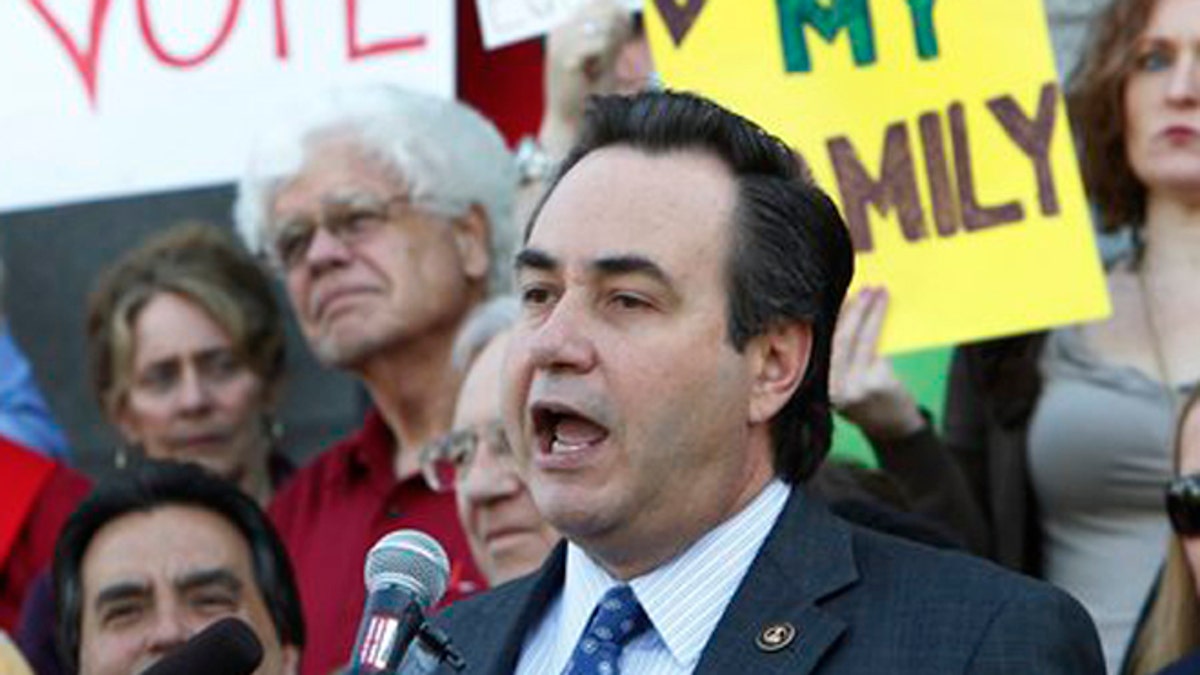
Openly gay Sen. Pat Steadman, D-Denver, speaks at a rally supporting Civil Unions at the Capitol in Denver on May 14, 2012. (AP Photo/Ed Andrieski)
Minutes after President Barack Obama endorsed gay marriage on May 9, Colorado's Democratic governor choked back tears as he ordered state lawmakers to reconsider a civil-unions measure defeated the day before by Republicans.
In the week that followed, the debate over equal rights for same-sex couples consumed the Capitol. Republicans succeeded in killing the measure, but lawmakers from both parties say the issue could play an important role in White House race in Colorado.
"Go back to your communities, go back to your neighborhoods, go back to your churches and let them know that the fight continues," Republican House Speaker Frank McNulty told gay-marriage opponents gathered outside the Capitol last Tuesday.
Colorado Democrats predict that their loyalists, as well as independents, will rally behind Obama, given his support of same-sex marriage.
"That will have a positive impact on the chances of the president being re-elected and winning Colorado in November," said Democratic Rep. Mark Ferrandino, a gay lawmaker who co-sponsored the civil unions legislation and said that its supporters would be "very active" in the fall on the issue.
Obama plans to give the commencement address Wednesday at the U.S. Air Force Academy in Colorado Springs, before attending fundraisers in Denver.
Since 2008, equal rights for same-sex couples -- either through civil unions or gay marriage -- has flared in a few of the most contested presidential states. Two of those, Iowa and New Hampshire, now recognize gay marriage. North Carolina recently took the opposite stance, voting to strengthen its ban against gay marriage.
But the fight in Colorado has proved especially bitter, and feelings on both sides are raw. So Republicans and Democrats are bracing for social issues such as gay marriage and civil unions to factor into voters' calculations about whether to back the Democratic incumbent or likely GOP nominee Mitt Romney, who opposes allowing gay people to get married.
The economy is certain to dominate the race in the state. Colorado's unemployment rate is 7.9 percent, lower than in some swing states and marginally lower than the national average of 8.1 percent. But with joblessness falling, social issue could well become more of an issue in voters' minds.
Colorado has nine electoral votes, and the state is evenly divided among registered Republicans, Democrats and independents.
Look no further than the state's evolution on same-sex partnerships as evidence of its swing nature.
Just six years ago, Coloradans overwhelmingly voted to change the state constitution to ban gay marriage after a campaign largely funded by Focus on the Family, a conservative group based in Colorado that's influential across the nation.
By this spring, though, there was enough bipartisan support in the state Legislature to approve civil unions. Yet GOP leaders twice used legislative maneuvers to stop same-sex recognition, most recently last Monday.
Republicans accused Gov. John Hickenlooper of taking marching orders from the White House by pushing the civil union measure in hopes of diverting attention from the sluggish economic recovery.
"Make no mistake about it," McNulty said. "It's absolutely clear to me that Gov. Hickenlooper is reading straight from President Obama's campaign playbook."
Democrats said Colorado Republicans filibustered equality.
Some conservatives insist that Obama's position on marriage will hurt him in Colorado.
"Six years is not a long time," said Carrie Gordon Earll of CitizenLink, the public policy arm of Focus on the Family. She was referring to the state passage of its gay marriage ban. "I would think a majority of voters would say, `That does not align with my views."'
Others counter that Colorado's views may be changing as quickly as the nation's. Consider that a handful of Republicans in the House said they'd support civil unions, meaning the measure would have passed if GOP leaders hadn't maneuvered to prevent a vote. Senate Democrats have passed civil unions two years in a row, both times joined by Republican women in the Senate.
Some Republicans fear that the GOP's civil unions stand in Colorado could harm the party with independent voters.
"The truth is we may have not only sacrificed our razor-thin House majority, but we also may have permanently impaired Republican prospects in Colorado at all levels, including for the presidential race," said Alexander Hornaday, president of Colorado Log Cabin Republicans, a gay rights organization.
Then there are those who doubt the issue's potency come the fall. Among them is Kirk Fordham, the executive director of the Denver-based Gill Action Fund. The political organization is funded by Tim Gill, a nationally prominent gay rights activist credited with helping fund a Democratic takeover of Colorado's legislature in 2005.
"By the time we get to November," Fordham predicted, "the attention will largely have shifted back to economic issues."




